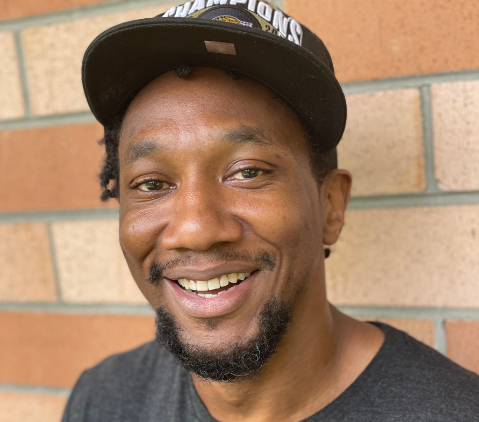Every Turning Leaf participant is unique. Special. Different backgrounds, different education levels. Different family structures and barriers to success.
Troy, though. Now here’s a guy who really stands out. He was educated in some of the top schools in Charleston. He was the first male in his family to graduate from high school. He had all the markers of a successful future ahead of him.
But when a series of bad decisions threw up roadblocks, and a domestic altercation landed him in prison, Troy had to face a far different future: 18 years behind bars. What he’s doing with his life now, though…that’s a story we’re excited to tell.
Everyone, meet Troy.
* * * *
Troy grew up in Hollywood, South Carolina, on the south side of Charleston County. His community was close and filled with family. Aunties and uncles, grandparents and great-grandparents. He tested into two of the top schools in the area, where he saw what support, encouragement, and assistance can mean to children hoping to succeed. He even started college at Benedict in Columbia. Things were looking good.
But teenagers are teenagers, and they don’t always make the best choices. We’ve all been guilty of it. But for Troy, the mistakes and missteps started to snowball. “My problems came from being young, having unprotected sex, and having children,” he says. “It all slowly but surely eroded my decision-making.”
By age 19, Troy had fathered three children with two women. One baby-mama had him on the hook for child support; when the other was pregnant with their second child, Troy’s mother told him, “Come home and give her honor. Don’t be having children all over the place.”
At 19, Troy was married with three children by two women.
“Being married that young requires a level of maturity I just didn’t have,” says Troy. He started selling drugs to help make money. “I closed off doors to opportunities early. I didn’t get caught selling drugs, but if your morals slip to a point where you’re okay with doing things just because you can get away with it…this is how you wind up cheating on your wife, having another baby outside your relationship, and destroying a marriage.”
In the end, Troy caught a major charge for a domestic dispute. He and his wife got into a fight; things deteriorated rapidly. “I was acting a fool,” he says. “I had a tantrum.”
Following his arrest, Troy tried to be helpful, but his 19-year-old naivete showed. With no lawyer to advise him otherwise, he penned a seven-page statement about the events leading up to and including the altercation. He felt he was justified, thought any rational person would read the statement and understand the nature of his meltdown. There were extenuating circumstances: the stress of a marriage under duress. A sister and an auntie succumbing to Multiple Sclerosis. His own seizure disorder. Surely the police would understand.
Instead, Troy learned the reasons behind Miranda rights: anything you say can and will be used against you. His “statement” was his confession, and it was used against him.
With this document in hand, prosecutors had an open-and-shut case. Troy declined a plea deal for 15 years, sure that he would come off with a lighter sentence based on the evidence he provided. His public defender advised him not to take the stand and Troy listened.
In the end, he was found guilty of numerous charges related to that domestic altercation and was sentence to 18 years.
Eighteen years!
“I was part of the PTA,” he says. “People say Black men don’t raise their children. I was doing that. But they had enough to convict me, so they did.”
And so Troy’s 18-year stint in South Carolina state prisons began. “Prison can be a diamond mine or a graveyard,” he says. “I chose to invest in myself. I studied, took classes. Yoga, Toast Masters. I helped people studying to get WorkKeys and their GEDs. I got my own gold WorkKey.” He did everything he could to be ready on his release day.
It’s never easy, though. Not for formerly incarcerated men returning home after prison.
Troy’s first barrier came in the shape of housing. His charges included kidnapping, so he was registered as a sex offender. Suddenly, he couldn’t live with his mother, who cares for his young nieces. His grandmother’s vacant house next door was approved, but it wasn’t livable. Termites and roaches, years of disuse and disrepair had had their way with it. The renovations required to clean up the house were a blessing in disguise: his whole family had to work together to make it a home.
Except: Troy isn’t allowed to hang out with his two brothers. They’ve been in prison too, and their parole conditions force the siblings to stay apart. Just another barrier to overcome; less family to lean on and love.
Troy came to Turning Leaf seeking an advocate and found new family instead. “Turning Leaf does he right things to help people,” he says. “For one, they give out food, which doesn’t sound like a lot, but when you’re trying to be responsible, that one simple thing makes a huge difference.”
Turning Leaf is also helping Troy get his health back on track. After so many years in prison on the same medication, his seizure disorder needed a change in treatment. That adjustment led to his first seizure in a long time, but Turning Leaf was with Troy every step of the way, helping him to and from medical appointments, and supporting him outside of the center. And even though he took lots of CBT classes while still in prison, Troy firmly believes the repetition of cognitive skills in the Turning Leaf classroom helps reinforce all his hard work.
And here’s the thing: Troy is going to change the world after he graduates. We’re quite certain of it. “I’m a star, not a planet,” he says. “Wherever I go from here there’s going to be change. I’m full of pride and I’m a hard worker. I don’t want to sit here and complain and tell you the system did me wrong. I want to be part of the change to make things better.”
What does he think will help? “Support and recognition of people who are most at risk,” he says, citing one of his sons as a recent example. “He was doing great in school. He plays football and has a scholarship for college waiting for him. But when you’re poor, no one looks out for you. With Covid, my son dropped straight off the map in school and no one noticed.” Troy wants to help boys like his son, and men like himself.
“In the future I plan to do anything to assist Turning Leaf because they’ve done nothing but support me from Day One. I’ll either be a part of Turning Leaf and go hard for it, or I’ll start something myself. But people need to know they have value. I can help with that.”
* * * *
Troy could have written this piece himself. He didn’t need us to interview him, to tell his story for him. But we’re honored to have had the chance to get to know a person we truly believe will change the world. Good luck, Troy, as you finish up here and move onto even bigger things. We have your back all the way!

